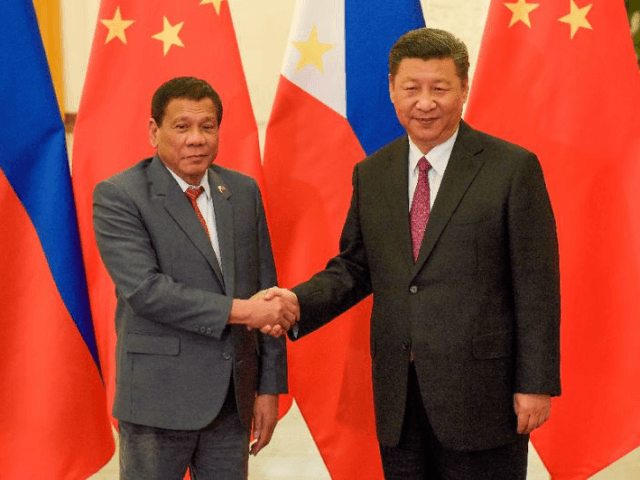Philippine President Rodrigo Duterte told reporters on Sunday that he had kept his promise to challenge Chinese counterpart Xi Jinping on his nation’s illegal military constructions in the South China Sea. According to the Philippine Star, Duterte said Xi responded to his concerns by saying, “No, it’s nothing.”
“I was talking about the military buildup, he says, ‘No, it’s nothing,’” Duterte told reporters, noting that the Philippine head of state said that he believed Xi understood the potentially disastrous consequences for China should he use military force against his neighbors.
“He knows that if he goes to war, everything will blow up. He acknowledged that war cannot be promoted by anybody, but it would only mean destruction for all of us,” Duterte affirmed.
Duterte and Xi engaged in a “frank and very candid” discussion in Vietnam this weekend, according to presidential spokesman Harry Roque. The two were in Vietnam for the Asia Pacific Economic Cooperation (APEC) summit in that country, and Xi later traveled to Manila for the Association of Southeast Asian Nations (ASEAN) summit.
“China responded by assuring that they are not ready to go to war with anyone and the Philippine president also clarified that it is not to the Philippine interest to resort to the use of force as well,” Roque asserted.
Duterte himself, who has repeatedly refused to challenge China in the South China Sea and has stated that the Philippines “cannot engage China in a war,” said that Xi was “quite surprised” that he mentioned the South China Sea dispute at all. Duterte explained that he felt pressure as the president of ASEAN to raise the concerns of other member nations, including Malaysia and Vietnam, about China’s colonization of the region. Duterte also faces pressure to confront China at home from an increasingly distrustful Philippine public.
“I said, ‘I’m not raising any sovereignty issue. Do not worry.’ But I said, ‘As chairman, I was made the tunnel for the communications to be active. I have to do it because the Philippine chairs the ASEAN now.’ I cannot escape from that duty,” Duterte said he explained to Xi.
Duterte noted that, in addition to dismissing concerns of a military threat, Xi insisted that the Philippines would “have all the rights of safe passage and that would be also applicable to all countries.”
China claims most of the South China Sea and has conducted significant construction operations in reefs near the Spratly and Paracel Islands, which belong to Vietnam and the Philippines. Among the constructions are artificial islands reportedly boasting surface-to-air batteries, fighter jets, advanced surveillance technology, and “very large underground structures.”
While the South China Sea issue largely remained in the background of the ASEAN conference after Duterte brought it up at APEC, the Chinese state media outlet Xinhua announced on Monday that China would work with ASEAN to establish a “code of conduct” for vessels traveling through the South China Sea.
“China, which has most of its freight of foreign trade passing through the South China Sea, wants peace and stability for that area more than any other country,” Chinese premier Li Kequiang is quoted as saying. A “framework” for such a code of conduct exists already, according to Xinhua, and nations now need only to fill in the details.
Philippine Foreign Affairs Secretary Alan Peter Cayetano told reporters that some specifics the Philippines would seek to enforce with such a code will include “preservation of marine life, access to fishermen, having less navy vessels and personnel and more coast guard members in the disputed waterway.” The Philippine Star notes that public statements on this code of conduct conspicuously seem to lack the phrase “legally binding.”

COMMENTS
Please let us know if you're having issues with commenting.